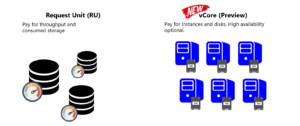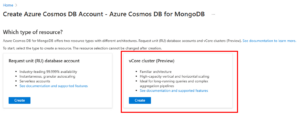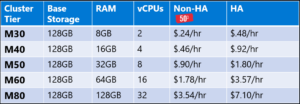Building intelligent applications such as chatbots, recommendation systems, and other transactional workloads are at the top of developers’ to-do lists, thanks to the explosive growth of AI for building cost-effective and engaging ways to interact with customers. A high-performance intelligent application requires a data strategy that can support rich querying and real-time responsiveness.
Azure Cosmos DB is a key product in the Microsoft Intelligent Data Platform, a comprehensive end-to-end platform that empowers customers to innovate anywhere at scale. Built for the speed and scale these intelligent applications require, Azure Cosmos DB now enables developers to modernize their MongoDB data to an open source-compatible cloud. MongoDB is a popular NoSQL database system. With this update, developers can use that data to bring a broader set of intelligent application scenarios to life, like powering real-time chatbot experiences.
The new Azure Cosmos DB for MongoDB vCore service, available in preview, offers a familiar architecture for developers, native integration with many Azure services, low costs, and enhanced database querying abilities with full-text search for chatbots and other intelligent applications. Azure Cosmos DB for MongoDB vCore was designed for MongoDB developers and provides an alternative to the original Azure Cosmos DB for MongoDB throughput Request Unit (RU) architecture. With two choices for running MongoDB data workloads, Azure Cosmos DB offers developers the flexibility to choose which architecture works best for each workload
By offering a wide range of open source-compatible services, including Azure Cosmos DB for MongoDB vCore, Azure provides developers with the flexibility and freedom to choose the best technology stack for their needs. In addition to MongoDB, Azure Cosmos DB supports open-source PostgreSQL and Apache Cassandra.
With Azure, developers can take advantage of powerful, fully managed services that are designed to work seamlessly with their existing open-source tools and workflows. This commitment to open source compatibility, combined with Azure’s robust and secure infrastructure, means developers can innovate faster and more securely on Azure – with more flexibility.
Let’s dive into the unique features and benefits of Azure Cosmos DB.

Seamlessly Integrated with Azure
Azure Cosmos DB for MongoDB vCore is a fully managed, native Azure service with deep integration with various Azure products and services, such as Azure Monitor and Azure CLI. This seamless integration allows developers to manage their resources effortlessly using familiar Azure tools, boosting efficiency, and simplifying workflows. Furthermore, developers can enjoy peace of mind knowing they have access to a unified support team for all their services, eliminating the need to juggle multiple support teams for different services.
“We chose Azure Cosmos DB for MongoDB vCore because of its integrations in the trustworthy Azure ecosystem, high performance for our workloads, and low total cost of ownership. We can point our existing applications to it, and it just works with no code changes.” -Dominic Buchheit
Modernize MongoDB Data with a Familiar Architecture
Azure Cosmos DB for MongoDB vCore offers a familiar vCore architecture, making it easy for developers to transition existing MongoDB workloads to Azure or build new modern applications. The architecture and features of the service are designed to match developers’ expectations, ensuring a smooth and seamless experience.
Cluster Tiers That Offer Low Total Cost of Ownership (TCO)
Azure Cosmos DB for MongoDB vCore is designed to deliver the best performance and cost efficiency for our customers’ workloads. Its scalable architecture allows them to optimize resource utilization and keep infrastructure costs low. Customers pay competitive rates based on compute and storage, grouped into cluster tiers based on vCPUs and RAM. The cluster tier can be scaled with no downtime as workloads scale.
Developers save 50% on non-HA clusters since they require fewer resources. Non-HA is great for workloads such as development and testing. With Azure Cosmos DB for MongoDB vCore, we pass the savings on to our customers, ensuring a great TCO for their organizations.
*US East Region
Get Started Now!
Azure Cosmos DB for MongoDB vCore is a powerful, flexible, and cost-effective solution for developers to modernize MongoDB workloads to the Azure platform or build new modern applications on Azure. Now in preview, customers can get started by creating a cluster in the Azure Portal. We can’t wait to hear your feedback! This new offering will be showcased at the Azure Cosmos DB Conference on March 28, 2023.





Looks interesting!
Some questions....
What is the actual storage limit for unsharded DB? (Docs say "with no shard key required until the database surpasses TBs")
If we already know the max RU that a collection uses can this be used to estimate what the required VCore count would be?
What are the backup options for this model?
Can analytical store be used with these accounts?
Will HA allow the replica to be created in a different region?
In RU model each physical partition contains 4 replicas of the data - is the same underlying architecture used here (but just without the 50GB physical partition storage limit)?
Hi,
Looks like the vCore option does not support private endpoints. Is that correct ?
Regards,
Kurt